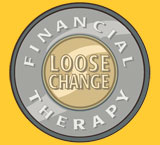PLEASE NOTE: LOOSE CHANGE IS ON HIATUS UNTIL THE END OF 2023.
"Ten years ago, every book I looked at on money management started with the premise that managing money is simple if you have a good relationship to money. None of them followed up with what the reader should do if they had a bad relationship with money."
— Amanda Mills, circa 2001
"It is easier to tell our therapist about our sex life than it is to tell our accountant about our finances. Money - not necessarily how much we have, but how we feel about it - governs our lives as much or more than any other factor."
— From: Your Money or Your Life by Joe Dominguez & Vicki Robin
There has never really been an appropriate place to express financial angst. Crying in the accountant's office is embarrassing and often finances are not therapists' strong suit. And yet, how we feel about money is one of the biggest predictors of how materially comfortable we will be. Financial therapy provides an opportunity for those wishing to better understand their emotional relationship to money.
By combining therapeutic and business management techniques, Loose Change and other financial therapy providers are able to help clients identify and tackle the causes of financial issues. Compulsive behavior with money has little to do with the amounts involved. In fact, there are two financial spectrums: the one we all know about, which is rich versus poor, and the one I find even more useful as a financial therapist, scrambling versus hoarding. Scramblers never have enough to pay their bills, while hoarders feel that their pile of money is not big enough.
Trauma leaves its mark on money management, just as it does on other aspects of life. One aim in financial therapy sessions is to help clients identify whether or not money is in fact the main issue or whether other core matters are playing themselves out in their money behaviours. Another goal is to help triage what area of money is causing the most angst: debt, earning, investing, managing, or spending.
Psychology, sociology, economics, and addiction are all fields that inform the practice of financial therapy. Financial dysfunction comes from life experiences that are as much sociological as psychological.
Financial therapy works best in an honest, trusting and non-judgmental environment. At Loose Change, we work hard to promote such an atmosphere to help you confront and strategize around money trauma.

